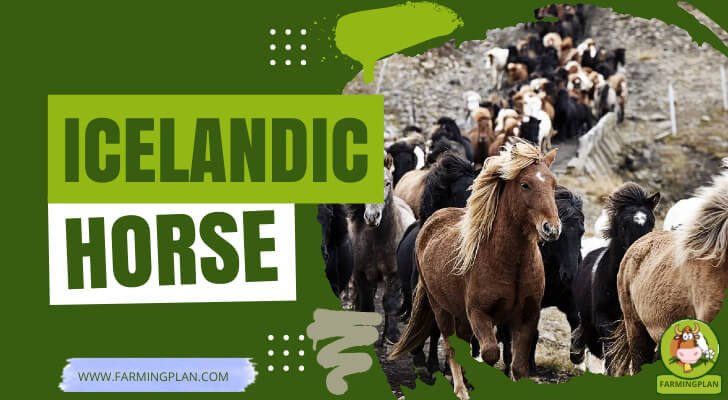I knew I had encountered something special when I met an Icelandic horse. Their gentle temperament, combined with the unique tilt gait, made riding feel like floating. I’ve never experienced such a smooth ride on any other breed. What struck me most was their intelligent and affectionate nature; they quickly formed strong bonds with their owners. Over time, my Icelandic Horse became a trusted companion and a source of joy and peace. If you’re looking for a versatile and friendly horse, I highly recommend considering the Icelandic Horse.

Physical Characteristics of the Icelandic Horse
This Horse are compact and strong. They typically stand between 12 to 14 hands (48 to 56 inches) tall. Despite their small size, they are well-muscled and robust, which makes them capable of carrying out hard work over long distances. They have a thick, double-layered coat, which protects them from harsh cold temperatures in Iceland. Their coats come in various colors: bay, black, chestnut, and grey.
One of the most striking features of This Horse Horse is its mane and tail. Their long, thick, flowing manes add to their charming appearance. Icelandic Horses also have a broad forehead and expressive eyes, giving them a gentle, approachable look. These horses are built for endurance, with strong legs and hooves that can handle rugged terrain.
Icelandic Horse Gait
One of the most remarkable things about This Horse is their ability to perform unique gaits, the tilt, and the flying pace. The tilt is a four-beat gait that is extremely smooth and comfortable for the rider. It’s often compared to a fast walk but much smoother, making it a pleasure to ride over long distances. Riders can experience the tilt at different speeds, making it ideal for both casual and more energetic rides.
The flying pace is another unique gait in which the horse lifts both front and back legs off the ground at the same time. This fast, two-beat gait is used in racing and competitive events. Icelandic Horses are among the only breeds that naturally possess these unique gaits, making them stand out from other horse breeds.
Temperament and Personality
This Horse are known for their calm, friendly, and intelligent nature. They are typically very gentle and easy to handle, which makes them great for riders of all skill levels. Their temperament is one of the reasons they are so beloved as family horses. They have a patient and tolerant disposition, which makes them excellent companions for children or new riders.
Despite their calm nature, This Horse are energetic and enjoy being active. They are always eager to participate in riding activities, whether a casual ride in the countryside or a more intense ride in a competitive setting. Their willingness to learn and their positive attitude makes them very trainable. They are also known for their loyalty and can form strong bonds with their owners, which creates a deeper relationship.
Read More: Tennessee Walking Horse: Why This Breed is Perfect for Beginners and Experienced Riders
Icelandic Horse Care
Caring for an This Horse requires attention to their grooming, feeding, and exercise needs. Grooming is essential, especially for their long coats. Regular brushing helps remove dirt and tangles and ensures they remain comfortable in all weather conditions. Their hooves should also be cleaned regularly to avoid any issues with infections or discomfort. In terms of feeding, Icelandic Horses are hardy and thrive on a simple diet. They typically eat hay and grass, but ensuring they have access to fresh water and any necessary vitamins and minerals is essential. Despite their hardy nature, Icelandic Horses can benefit from additional care in colder months, such as providing extra bedding or shelter from harsh weather.
Exercise is vital for keeping This Horse healthy. Regular riding or turnout in a field will help them maintain their fitness and energy levels. While they are built for endurance, gradually increasing their activity level is essential to avoid overexertion.
Health and Lifespan of the Icelandic Horse
This Horse are generally healthy and hardy, thanks to their genetic background and ability to adapt to harsh climates. One of the benefits of this breed is its resilience, which means they tend to have fewer health issues than other breeds. However, like any horse, regular vet check-ups and good care are essential for ensuring their long-term health.
The average lifespan of an Icelandic Horse is around 25 to 30 years, but some can live longer with proper care. One common health issue to be aware of is their hooves, which need regular trimming. If not correctly maintained, hooves can become cracked or infected. Dental care is also essential, as horses with long lifespans may develop dental issues over time. Overall, This Horse rugged nature makes it a low-maintenance breed in terms of health, but regular care and attention are still needed to keep them in the best shape.
Read More: Missouri Fox Trotter Horse: The Shocking Truth Behind Its Incredible Endurance and Smooth Ride
Icelandic Horse and Riding Styles
This Horse are incredibly versatile and can be used for many types of riding. They are often seen in trail riding, endurance riding, and even competitive events like showing. Because of their smooth tilt gait, they are particularly well-suited for long-distance trail riding, providing a comfortable ride for the rider. In addition to trail riding, Icelandic Horses can perform in competitive settings. Their flying pace gait makes them ideal for races, while their adaptability makes them competitive in dressage and other events. Many riders enjoy exploring different disciplines with their Icelandic Horses due to their wide range of abilities.
Training Icelandic Horses
Training an This Horse can be a rewarding experience, as they are known for being intelligent and willing learners. Basic training for Icelandic Horses involves building trust with the horse and using positive reinforcement methods. These horses respond well to praise and rewards, which makes them ideal for owners who prefer gentle training techniques. Consistency and patience are key when teaching gaits like the tilt. Many riders start with groundwork before moving on to riding exercises. Giving the horse ample time to learn the unique movements and gaits is essential, as they require balance and coordination.
Training This Horse for competition requires dedicated practice, especially at a flying pace. Riders can work on improving speed and agility through specialized exercises and conditioning. With time and proper training, Icelandic Horses excel in various equestrian sports.
Read More: Peruvian Paso Horse: Don’t Miss Out on the Smoothest, Most Powerful Ride of Your Life
Icelandic Horses in Competition
Icelandic Horses are not just great companions for trail riding and leisure activities—they also excel in competition. Their tilt gait makes them standout in competitions, where smoothness and precision are crucial. Riders and horses can participate in various events, including dressage, show jumping, and endurance races. In addition to their unique gaits, This Horse are known for their stamina and determination, which make them well-suited for endurance competitions. They can cover long distances without tiring, making them popular for riders in competitive trail events.
Regular training, conditioning, and experience are important for those looking to compete with their This Horse. Riders can enhance their horse’s performance by focusing on building speed, agility, and endurance.
FAQ
What is the average height of an Icelandic Horse?
This Horse typically stand between 12 to 14 hands (48 to 56 inches) tall.
What makes the Icelandic Horse’s gaits unique?
This Horse is known for its tilt and flying pace gaits, which are smooth and comfortable for riders.
How long do Icelandic Horses live?
The average lifespan of an Icelandic Horse is around 25 to 30 years with proper care.
Are Icelandic Horses suitable for beginners?
Yes, Icelandic Horses are gentle, friendly, and easy to handle, making them ideal for riders of all experience levels.
What types of activities are Icelandic Horses suited for?
Icelandic Horses excel in trail riding, endurance competitions, and showing due to their stamina, smooth gaits, and versatility.
Conclusion
The Icelandic Horse is a unique and versatile breed known for its smooth gaits, friendly temperament, and remarkable stamina. Their hardy nature and ability to adapt to different environments make them ideal for recreational and competitive riding. With their compact size, distinctive gaits, and loyal personalities, Icelandic Horses are beloved by riders of all skill levels. Whether for trail rides or endurance races, these horses form strong bonds with their owners and continue to thrive in various equestrian sports, proving themselves exceptional companions.


